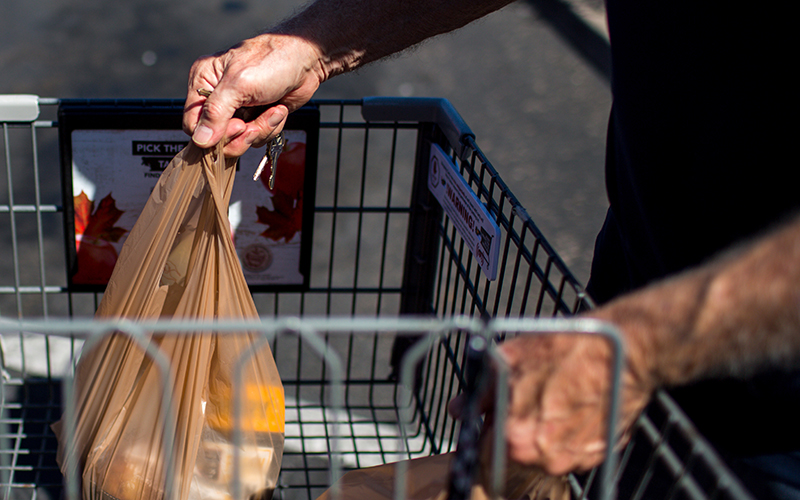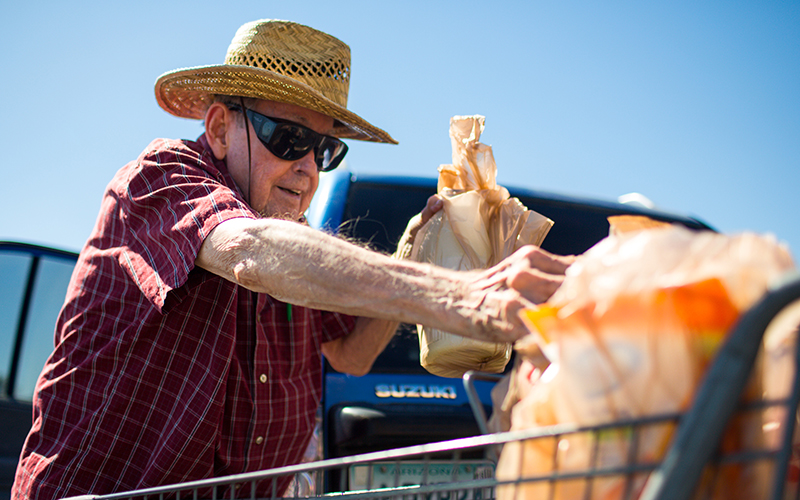PHOENIX – Kroger, owner of Fry’s Foods in Arizona, will phase out plastic bags by 2025, becoming the latest company to respond to the backlash against single-use plastics.
The grocery chain will transition to reusable bags in all 2,800 stores, starting in the Seattle area.
Pam Giannonatti, spokeswoman for the Fry’s Food division of Kroger, said she doesn’t know when the transition will start in Arizona. In the meantime, she hopes customers will start changing their habits.
“We’re highly encouraging our customers to shift their shopping habits and use reusable bags,” Giannonatti said. “We’re not taking away the bags tomorrow.”
The plastic bag phaseout is part of the Zero Hunger, Zero Waste initiative at Kroger, which is the largest grocer nationwide and the market-share leader in Arizona with 123 stores. The grocer is aiming to become zero waste by 2020 and is trying to minimize food waste by 2025.
“It’s about being a leader,” Giannonatti said. “It’s the right thing to do for the environment and for the coming generations.”
Kroger is the most recent large company to eliminate or reduce single-use plastics in response to environmental concerns. Disney, Starbucks and McDonald’s recently announced plans to get rid of plastic straws.
Chicago, New York, Los Angeles and other cities also have taken up the fight against plastic waste with bans or fees on plastic bags.

Chuck Nolan loads plastic grocery bags into his car outside a Fry’s Food & Drug Store in Phoenix. Kroger, which owns Fry’s, plans to transition to reusable bags in all its 2,800 stores by 2025. (Photo by Nicole Neri/Cronkite News)
Similar efforts have been tried in Arizona. Bisbee passed an ordinance in 2012 that banned retailers from providing plastic bags. A few years later, Flagstaff and Tempe considered similar ordinances.
But in 2015, the state Legislature prohibited cities and municipalities from regulating plastic bags and other single-use containers. Supporters say the state needed the law because retail organizations and lawmakers were concerned about confusing people with a patchwork of local ordinances.
“A law like this makes it consistent throughout the state,” said Tim McCabe, president of the Arizona Food Marketing Alliance. “Consumers and tourists shouldn’t have to wonder from city to city if they are going to have to pay for plastic bags, or if they have to bring in reusable bags.”
Flagstaff and Tempe dropped their plans for plastic bag bans after the state passed the law. Bisbee repealed its ordinance in 2017 after Arizona Attorney General Mark Brnovich said the ban violated state law, and he threatened to withhold state funding from the city.
Diane Brown, executive director of the Arizona Public Interest Research Group, a consumer advocacy organization, said Arizona’s law means businesses and individuals will have to lead the effort to reduce single-use plastics in the state.
“By Kroger taking the lead and stating that it will phase out single-use plastic bags, we expect other large grocery chains and businesses will recognize the economic and public health benefits and follow suit,” Brown said.
Single-use plastics have come under increasing fire for their harm to wildlife and the environment.
The average American uses about 1,500 plastic bags a year, but only 1 percent are recycled, according to the Center for Biological Diversity in Tucson. The rest end up in landfills or the ocean, where the bags break down into microplastics that contain toxins and can harm wildlife that may mistake the brightly colored plastic for food.
Plastic bags also use large amounts of oil in the manufacturing process, which contributes to greenhouse gas emissions and worsens air pollution.
“Nothing that we use for a few minutes should threaten our health for hundreds of years,” Brown said.
This story is part of Elemental: Covering Sustainability, a new multimedia collaboration between Cronkite News, Arizona PBS, KJZZ, KPCC, Rocky Mountain PBS and PBS SoCal.
Connect with us on Facebook.
